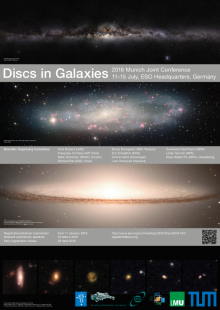Discs in Galaxies
2016 Munich Joint Conference
Garching, July 11 - 15, 2016
The aim of this Joint international conference is to explore the importance of stellar and gaseous discs in a variety of galaxies from high redshift to the Milky Way in the context of exciting new observations and numerical simulations.
Rationale:
Understanding how the internal structures of galaxies form and evolve is key to understanding the origin of the Hubble sequence. This is a timely topic given the current investment in high resolution instrumentation which probes the resolved properties of distant galaxies and the increased detail in our understanding of stars and gas in nearby galaxies. Stellar and gaseous discs represent the most important structural component in normal galaxies and interpreting their early formation and destruction via observations and numerical simulations indicates the key processes that shape the eventual Hubble sequence. Observations of discs in high redshift star-forming and quiescent galaxies are complemented by an increasing detailed understanding of the kinematics and chemistry of stars in the Milky Way. The conference will synthesize these different aspects of disc evolution at an important time when exciting new results are arriving from resolved studies of distant galaxies as well from numerous Galactic surveys.
Key questions the meeting will address include:
- What can the kinematic and chemical structure of the Milky Way and nearby galaxies tell us about their earlier evolution? What is the consensus on the nature and origin of the proposed `thick disc’? How did the physically-extensive local HI discs form and become chemically-enriched?
- What processes given the duty cycle of self-regulated star formation and can these explain the exponential profile of stellar discs? Have we clearly understood why recent models claim to match local disc scaling relations? What explains the `disc-halo’ conspiracy proposed to explain flat rotation curves and what is the origin of turbulence in galactic discs?
- Can we reconcile the evolving mass-metallicity relations in the context of models for gas inflow and outflow? What are the prospects for observing and interpreting metal gradients in high redshift galaxies? How did the first disc galaxies form and what transformations occurred in the history of elliptical and lenticular galaxies? Can we understand the declining baryonic fraction with cosmic time?
The workshop will take place at the ESO Headquarters in Garching (Germany) from July 11 - 15, 2016.
This workshop is jointly supported and coordinated by ESO, MPA, MPE, the Excellence Cluster Universe, LMU and TUM
Conference email: discs2016@eso.org


